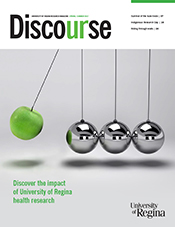By the book

1
Lynn Cote, a faculty member at First Nations University of Canada (FNUC), along with Margaret Cote, a former teacher with FNUC, provide an introductory look at one of the most widely spoken North American Indigenous languages, Saulteaux, known regionally as Ojibway, Ottawa (Odawa), Chippewa, and Algonquian, in their book Mācī-Anihšināpēmowin/Beginning Saulteaux (University of Regina Press, 2020). This easy-to-use and easy-to-read series of lessons is designed for self-study or for use in the classroom. The text sheds light on the Saulteaux worldview while guiding students through the language’s grammatical structures and spelling systems, as well as everyday terms and phrases grounded in both traditional and contemporary contexts. Beginning Saulteaux is an invaluable resource produced in consultation with Elders, Language Keepers, and community members.
2The canonization of particular artworks, aesthetic theories, and even the way that art has historically been displayed in museums and galleries has played a powerful role in shaping how Canadian settlers view themselves and the nation. InCreative Presence: Settler Colonialism, Indigenous Self-Determination and Decolonial Contemporary Artwork (Rowman & Littlefield, 2020), author Emily Merson, politics and international studies sessional lecturer, examines archival and contemporary images of artworks to make the case that Indigenous artists Rebecca Belmore’s and Brian Jungen’s selections of materials, media forms, and placemaking in their exhibitions and performances call attention to the foundational violence of settler colonialism. Merson argues that these artworks introduce political possibilities for decolonization and participate in Indigenous reclamations of lands and waterways in world politics.


3
Exploring Criminal Justice in Canada, 2nd edition (Oxford University Press, 2020) is an accessible examination of the Canadian criminal justice system. Introducing readers to the realities of criminal justice in today's world, author Rick Ruddell – justice studies professor and Law Foundation of Saskatchewan Chair in Police Studies – draws on case studies, media issues, and controversies to examine the organization and function of the criminal justice system and the individuals, social values, and legal systems that shape Canadian criminal justice institutions. Throughout the book, Ruddell addresses commonly held beliefs about the justice system and explores the evidence to support or refute those beliefs. While the book is focused on Canadian issues, Ruddell uses global comparisons to help readers understand criminal justice both in Canada and around the world.















